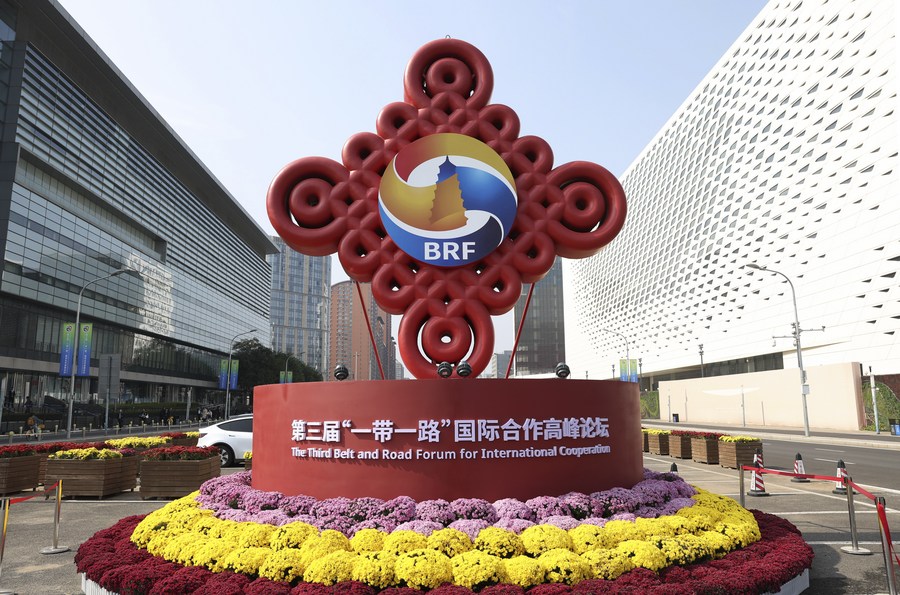Source:Xinhua 2024-01-02

This photo taken on Oct. 17, 2023 shows a decoration for the third Belt and Road Forum for International Cooperation near the China National Convention Center in Beijing, capital of China. (Xinhua/Chen Bin)
Experts and scholars from various fields share their insights here regarding China's diplomacy, global hotspots and international relations in 2023.
BEIJING, Dec. 30 (Xinhua) -- Experts and scholars from various fields share their insights here regarding China's diplomacy, global hotspots and international relations in 2023.
The following are some of the highlights.
In Guest Opinion: China injects new momentum into multi-polar globalization, Dr. Henry Huiyao Wang, founder and president of the Center for China and Globalization (CCG), a leading non-governmental think tank in China, wrote:
-- The rise of China is unstoppable, and decentralized world politics has become a trend.
-- Western countries got accustomed to being in the center with the non-West world on the periphery. However, as the strength of marginal countries grows, while the development speed of Western countries relatively slows down ... a more balanced and inclusive multi-polar world order is taking shape.
-- Against the backdrop of the global economic recession, the strong resilience, huge potential, and sufficient vitality of the Chinese economy do not change. China's continuous opening-up and development will continue to provide robust momentum for global economic recovery.
-- For a long period in the past, globalization has been dominated by Western countries. Notwithstanding, future globalization will be multi-polar, jointly driven by China, the United States, Europe and emerging economies.
In Guest Opinion: Farewell to U.S. dependence policy, Refaat Badawi, a political analyst and adviser to former Lebanese Prime Minister Salim al-Hoss, wrote:
-- Today's trend is moving towards organizing a new multilateral world system that depends on economic integration and local currency exchange, similar to what's happening between Russia, China, Saudi Arabia, and India.
-- Today, with regional and international changes taking place, economic and developmental interests have become the priority of policies adopted by states.
-- Economic and developmental interests are a priority, and they determine the political stance, not the other way around. But, unfortunately, Western countries, especially the United States, seem not to understand this.
-- In conclusion, the U.S. dependence policy is no longer effective, and dealing with the U.S. dollar is no longer mandatory. Instead, it is a policy that is disintegrating. The West must recognize these changes quickly.
In Guest Opinion: The Chinese way can overcome challenges for a shared future, Fabio Massimo Parenti, a foreign associate professor at China Foreign Affairs University, wrote:
-- China seems to provide the world with a unique and effective approach to building peace through the stabilization of international relations, the rejection of the new Cold War logic of power blocs, and the promotion of multilateralism, dialogue and cooperation.
-- Regrettably, the West is not investing in plans for the integration of peoples, countries and economies, but is choosing to foster a new arms race which can and must be stopped.
-- Since they no longer control globalization, U.S. leaders have now chosen to dismantle it to the detriment of Ukraine as well as people there and elsewhere by launching invectives, warnings and insults at any country that doesn't move in lockstep with the self-appointed rulers of the world.
-- If we look at the global destabilization created over the decades by the United States and its closest allies, we can expect that a world more influenced by China is likely to be characterized by more cooperation and less competition.
In Guest Opinion: Sinophobia is un-American, Josh Selig, the founder and president of China Bridge Content, wrote:
-- It became U.S. policy that no country except the United States could become a leader on the world stage.
-- It is true that China and the United States have some divergences. However, one must be careful to separate the wheat from the chaff when it comes to such criticisms, lest we fall prey to the sort of political witch-hunts that gripped the United States during the McCarthy era.
-- In recent decades, China has been widely regarded as a partner and friend of the United States, not because China wants to follow in the footsteps of the United States and become a global hegemon, but because China wants to develop its economy and its country and take its rightful place as a leader on the world stage alongside the United States.